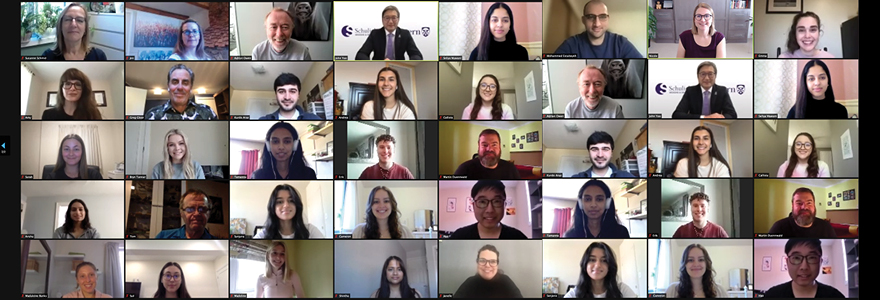Announcement: First Interdisciplinary Medical Sciences graduate program cohort begins studies

The first term of the Master of Science in Interdisciplinary Medical Sciences (IMS) program commenced on May 12, welcoming its inaugural cohort of 18 learners.
The one-year, course-based program takes on a multi-faceted approach to medical sciences by integrating various fields of study, including anatomy and cell biology, biochemistry, epidemiology and biostatistics, medical biophysics, microbiology and immunology, pathology and laboratory medicine, and physiology and pharmacology.
“One of things we’re most excited about is that we actually have a lot of students coming from outside of Western, from different undergraduate programs,” said Nicole Campbell, PhD, Director of Interdisciplinary Medical Sciences at Schulich Medicine & Dentistry.
“And they all have different future aspirations: some want to go into more clinical areas, some who want to pursue research and others are interested in policy. It has always been the goal of this program to open minds to different opportunities and perspectives out there.”
Cameron Hick, BMSc’21, is one of the incoming graduate IMS learners, having learned of the program through working with Campbell as an Undergraduate Summer Research Intern last summer. She hopes the IMS graduate program will bring her closer to her goal of becoming a mental health care professional.
“I am most looking forward to being surrounded by an innovative team of students and faculty looking to help one another succeed. Graduate school can seem daunting, but through the program's course block learning style, diverse faculty and collaborative learning opportunities, I feel confident it will be an extremely positive experience,” she said.
The admittance of a small yet diverse class of learners was intentionally done to best support the design of the program, which features immersive, consecutive learning blocks in specific knowledge and skill areas, experiential learning rotations and a group-based capstone project.
“We want to challenge their thinking, to think differently. So, from day one, we have to immerse them in a program that looks totally different,” Campbell said.
She explained that this was reflected in the application process, which many applicants had found to be unique. Applicants were asked to write their own reference letters, create timed video responses to various prompts, as well as identify and discuss a ‘wicked problem’ related to medical science in the written portion of their application.
Wicked problems are a central theme of the IMS program, referring to complex and relentless societal issues that require an innovative interdisciplinary approach. Campbell said she was impressed with the sophistication of successful applicants’ existing understanding of and approach to these issues. Common themes that were discussed included issues related to mental health, obesity, cardiovascular health and social determinants of health.
In her application, Hick chose to write about homelessness in Canada.
“To some, homelessness may appear to be a purely social issue. But it requires a multifaceted approach addressing the political, health care, socio-economic and medical science determinants that contribute to the problem and its solution.”
For the first month of the term, the emphasis will be on onboarding and preparation, as students and faculty navigate the first rendition of this program virtually. To help with team building, the students have already been connected via a Facebook group and will participate in a weekly book club hosted by Campbell.
The group’s first book, Into the Gray Zone by Adrian Owen, PhD, Professor of Physiology and Pharmacology, will provide them with the foundational knowledge for the very first four-week learning block – on the topic of science communication – which will be taught by Campbell and Owen in June. The remainder of the first term will see learners completing additional learning blocks in experimental design, as well as science policy.
“It’s important that we ease in and really prepare the learners with the skills they will need to be successful in their learning objectives later on in the program and beyond,” Campbell explained. “In the first few months, it’s about shifting their mindsets from being consumers of knowledge to being contributors to knowledge.”








